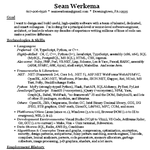I had wondered at the start of the Trump administration which of the two Trumps we’d get. We’ve pretty clearly gotten two in the past:
- Lazy Trump. This one likes the adulation of being President, but he doesn’t really do anything beyond that. During his first term, this Trump spent more time golfing than any President in history, and he often didn’t start work until 10 AM.
- Vindictive Trump. This one likes to punch. He’s a schoolyard bully, and he might back down whenever somebody stronger shows up, but mostly he likes to walk around hurting people who are smaller or weaker than he is. We didn’t see as much of this Trump during his first term, but we saw plenty of it on the campaign trail.
A couple weeks in, there’s little doubt that Trump 2.0 is the Vindictive model. From slash-and-burn tactics to ridiculous and ineffective tariffs to blaming the deaths of his fellow Americans on DEI policies, this Trump is clearly the angry, hateful one, not the lazy one.
That’s a shame. We could probably all live with the lazy one — we did it for four years already — but the angry one presents a conundrum. A screaming toddler with a flamethrower still has a flamethrower, and the Republican Party is far too cowardly to take his toys away this time.
And cowardice, mind you, is the correct term. I will happily call the current members of the Republican Party cowards to their faces: You sacrificed your spines and your consciences to a mook from Queens? Just so you could hate an inner-city single Black mother who just wanted a chance for her kids, and a brown man who just wanted not to starve, and two guys who were just kissing on a park bench? For shame, all of you. I don’t care if you got shot at overseas in uniform: Dishonor is dishonor, and that squelches whatever honor you might otherwise claim. I hope you have a really good answer when you’re standing someday in front of St. Peter at the Pearly Gates and he asks you whether you think you’ve earned your way in.
But I digress. There’s still the outstanding question of how to deal with the overgrown child that the American populace unwisely elevated to the Presidency, ideally before he does something so stupid and destructive that we can’t eventually fix it. Last time, he didn’t know how to drive the car; this time, he knows the controls just well enough to drive it into a tree at 100 MPH. If the Republicans hadn’t become utterly ineffectual parents, they’d take away the keys, or at least chauffeur him around again for the next four years. But that’s no longer viable: You can’t really hope a bad parent will become a good one, even with court-mandated parenting classes.
And the Democrats? They’re not worth mentioning. You might as well put your hope in tantric yoga and magical crystals.
Which means that there’s not really much left to pin hope on for the next few years. The courts might restrain him a little bit, but it’s unlikely. Realistically, Vindictive Trump is going to pick his victims, and he’s going to hurt his victims, and nobody’s going to do anything about it. One parent will look the other way, and the other will say “tsk, tsk,” and that’s as far as it’ll go. It’s a somber assessment, but it’s a sober one.
Someday — and as Liz Cheney so rightly noted, there will be a someday when Trump is gone — the history books will write their story of him. I can’t imagine it’ll be a good one. The people who joined the Confederacy, the ones who joined the Nazi party or the Communist party, the ones who followed John Birch and Joe McCarthy and George Wallace — they’re all denigrated by history, and rightly so, for the ignorance and hate which led them to those choices. There’s little doubt that Trumpism and its founder will join that ignominious group once the Baby Boomer generation has breathed its last, and those of us following after will describe them the same way every generation does when faced with the truth that so many of their forebears were, in fact, objectively pretty terrible people: “It was a different time.”
In the interim, we have to do our best to persevere: Ignore the toddler when he burns the foliage, try to offer shiny baubles to distract him away from anything important, and do our best to continually spray water in the fervent hope that when he’s gone at last, the house still stands.
…assuming, of course, that it’s not so divided that it still can.

